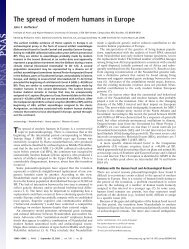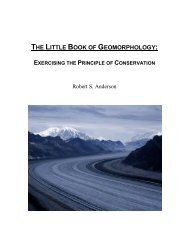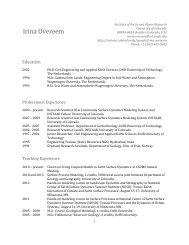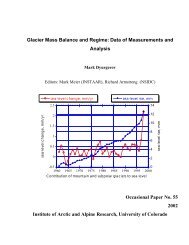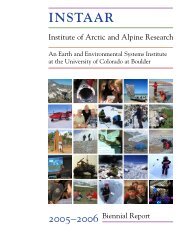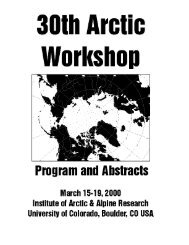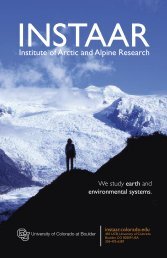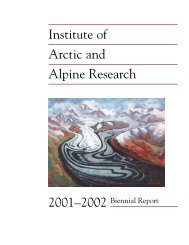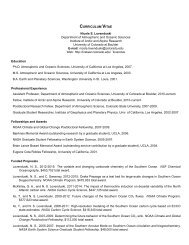Economic Feasibility Study of Colorado Anaerobic Digester Projects ...
Economic Feasibility Study of Colorado Anaerobic Digester Projects ...
Economic Feasibility Study of Colorado Anaerobic Digester Projects ...
You also want an ePaper? Increase the reach of your titles
YUMPU automatically turns print PDFs into web optimized ePapers that Google loves.
corrosiveness <strong>of</strong> biogas on electrical generators resulted in a “vicious cycle” <strong>of</strong> generator<br />
repair costs, while electricity costs continued during engine shut-down time.<br />
Mr. Barka stated that the primary motivation for maintaining the AD system was to remain<br />
within compliance with state air emissions regulation standards. In 2007-2008, the electrical<br />
generator was converted from biogas to natural gas. This involved considerable expense,<br />
although data were not available for costs incurred. Waste heat is used to maintain the<br />
digester and the farm flares <strong>of</strong>f the remainder <strong>of</strong> the gas. The company is not interested in<br />
returning to electrical generation, but acknowledges benefits to odor control and future<br />
potential for energy independence.<br />
Up to this point, Christensen Farms has been focused on stabilizing the AD system function.<br />
Mr. Barka provided the following insights into cost containment and areas <strong>of</strong> future revenue<br />
generation:<br />
• In fall 2008, approximately $180,000 was spent to replace the system’s cover.<br />
• The site employs a maintenance worker (at approximately $15-$20/hr.) who spends<br />
approximately 20-25 hours per week to ensure accurate digester operation.<br />
• The company qualifies for and eventually intends to obtain carbon credits.<br />
• The company is not currently using the effluent, but is considering this to be a future<br />
opportunity.<br />
Additional contact information:<br />
Christensen Farms Midwest, LLC: 23971 County Road 10 Sleepy Eye, MN 56085<br />
Main point <strong>of</strong> contact: Mr. Adam Barka (Environmental Resource Manager—MN):<br />
507-794-5310 ABarka@christensenfarms.com<br />
Mr. Dave Nord, Operations Maintenance Supervisor<br />
Lamar, <strong>Colorado</strong> contact: Mr. Kritch Stokey, Maintenance Specialist: 719-940-0087<br />
5.5 City <strong>of</strong> Greeley. Bruce Biggi, the <strong>Economic</strong> Development Manager for the City <strong>of</strong><br />
Greeley, is directing a large-scale effort to develop a “Greeley Clean Energy Park” on land<br />
within the Western Sugar Tax Increment Financing District. Biggi requested—and<br />
received—NEED grant funds to conduct a Phase 1 engineering and economic feasibility<br />
analysis for a co-digestion project. The City <strong>of</strong> Greeley contracted with the technology<br />
provider Symbios and Stewart Environmental Consultants to conduct the first phase <strong>of</strong> the<br />
study. The economic feasibility study began April 1 and the first draft <strong>of</strong> the report is<br />
expected by September 29. The final report will be due to the City <strong>of</strong> Greeley and GEO by<br />
October 30.<br />
Mr. Biggi (City <strong>of</strong> Greeley), Mr. Justin Bzdek (Symbios), Mr. Rick Jones (Symbios), and Mr.<br />
Forbes Guthrie (Stewart Environmental Consultants) attended an in-person meeting in the<br />
Symbois Ft. Collins <strong>of</strong>fice. Other discussions with Mr. Biggi pertaining to the project took<br />
<strong>Economic</strong> <strong>Feasibility</strong> <strong>Study</strong> <strong>of</strong> <strong>Colorado</strong> <strong>Anaerobic</strong> <strong>Digester</strong> <strong>Projects</strong><br />
Prepared by Dr. Catherine Keske, <strong>Colorado</strong> State University<br />
August 2009<br />
Page 34 <strong>of</strong> 79



